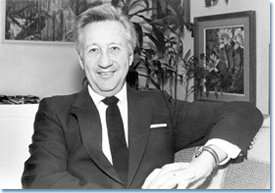
Lee Benson
Lee Benson died on February 10, 2012, from complications after a fall. At the age of 90, he was still doing what he did all his adult life, trying to fix the world. He always did it his way, and he never outlived his usefulness.
He had his formal education at Brooklyn College (BA, 1947), Columbia University (MA, 1948), and Cornell University (PhD, 1952). But he had his real education in World War II (as a first lieutenant in the U.S. Army, earning a Purple Heart and a Bronze Star for valor, and leading a platoon in the liberation of Dachau), in the Communist Party (as a community organizer, before he was expelled for “right opportunism”), and in the Bureau of Applied Social Research at Columbia (as a research associate and sometime lecturer, until Wayne State University took a chance on his political past and offered him a tenured teaching position in 1960). It was in the army and in the communities he struggled unavailingly to organize that he came to doubt Marxist doctrine on the primacy of class in social analysis. It was at the Bureau of Applied Social Research that he learned how to systematize his skepticism and his dawning appreciation of the power of cultural differences in American life.
In the half-dozen years between 1955 and 1961, Benson published three books that established him, barely out of graduate school and still in his 30s, as a formidable presence in the profession. Merchants, Farmers, and Railroads was a New Left classic before there was a New Left, anticipating a stream of subsequent work that found in allegedly popular reforms the very visible hand of business interests which sought their own advantage much more than the people’s good.Turner and Beard was a brilliant interpretive exercise that made recondite methodological issues vibrant as well as vital and resuscitated Beard’s interpretation of the Constitution before most historians had digested Brown’s and McDonald’s presumptive demolitions of it. The Concept of Jacksonian Democracy was Benson’s crowning work, in inventiveness and in influence. It gave birth at once to a new political history, a turn from economic to ethnocultural analysis, and an opening to quantification in American historical writing. It also gave powerful impetus to an emerging movement among historians to look more to the social sciences than to belles lettres for inspiration and identity.
Benson’s meteoric rise made many more traditional historians uneasy. At the height of his career, he provoked fears among more than a few of them that he meant to make over their profession or perhaps take it over from them for his own ends (though they never quite figured out whether those ends were social scientific or moral, or methodological or civic). Some of them disrespected him and even dismissed him as not really a historian. An odd duck. But most of them found him a force to reckon with. For years after I became his colleague, friends and acquaintances across the country and indeed around the world asked me incessantly and insatiably about him. He tantalized them. He was not like them, and they could not contain their curiosity. Some of them resented what they took to be his patronizing manner, but even the snarkiest of them recognized that, if he did condescend, he condescended more to senior professors than to anyone else. One of them remarked wryly that “he sees himself as a radical but doesn’t want to be fighting losing battles (yet he enters losing battles all the time). ” Another saw shrewdly that “he believes in a community of scholars, but he’s a lone wolf.” And yet they knew. When, in the 1970s, they were polled on the most influential American histories of their time, they voted The Concept of Jacksonian Democracy second only to Hofstadter’s American Political Tradition.
But for the last 20 years of his life, Benson put all that behind him. He humbled himself as few who suspected him of grandiose and imperial ambitions ever did. He gave up conventional academic scholarship to volunteer to work with Penn’s Netter Center for Community Partnerships, whose director had studied with him as an undergraduate and completed a dissertation under him as a doctoral student. In that new and unaccustomed role, he helped the center to conceive its university-assisted community school program, which became a national model for university civic engagement. He helped edit the center’s journal, Universities and Community Schools. He wrote or co-authored dozens of essays on the roles that universities might play in their communities and in educating students for democratic citizenship. He also wrote, with Ira Harkavy and John Puckett, a book, Dewey’s Dream (2007), which distilled his thinking and theirs on those subjects. To the very end, at 90, he was still co-teaching an undergraduate seminar on “Urban University-Community Relations.” As he often said, his work with the schools and the city was for him the most fulfilling, powerful, and delightful work he ever did. In it even more than in his towering scholarship and his unending political activism, he could act as he unabashedly begged all historians to act, as a “moral philosopher and public advocate” who applied his research to solving society’s problems.
Michael Zuckerman
University of Pennsylvania